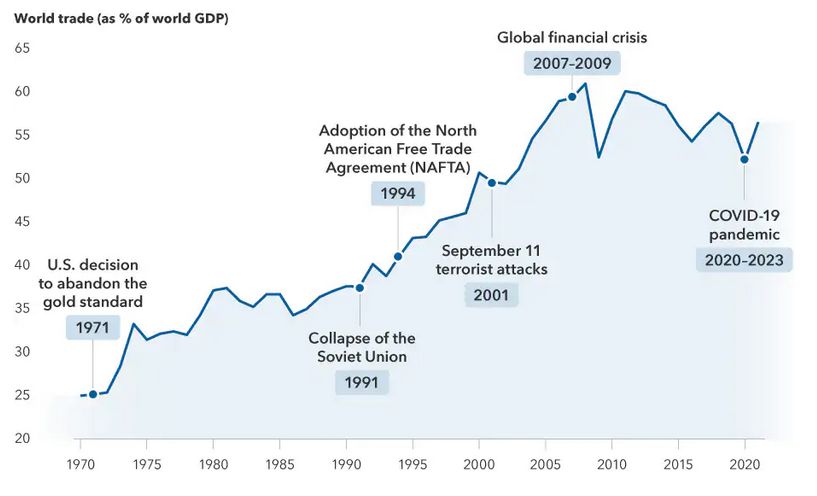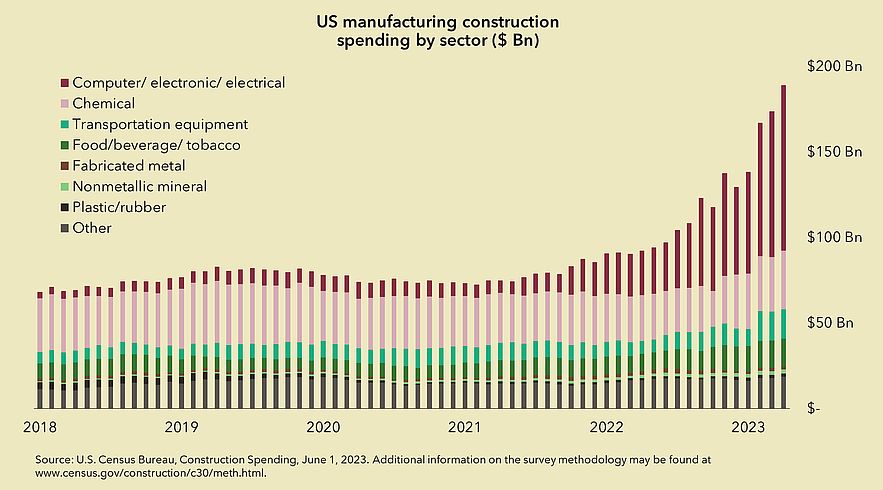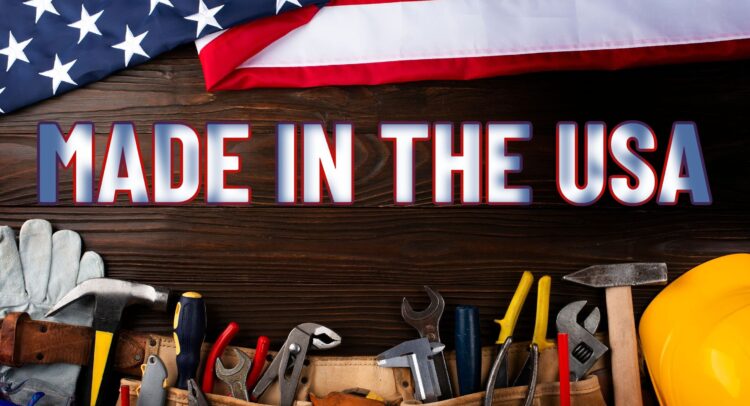In the past several years, the secular trends of deglobalization and “reshoring,” aka bringing manufacturing production home, have been gaining in popularity. Now, this trend is accelerating, spurred by the Biden administration’s investments and tax initiatives, as well as by its increasingly negative stance towards China’s advanced technology ambitions. As with all trends, reshoring is also expected to have its winners and losers. While the losers are mainly the offshore production sites, the winners – apart from the U.S. economy – can be found in almost all key industries.
Claim 70% Off TipRanks Premium
- Unlock hedge fund-level data and powerful investing tools for smarter, sharper decisions
- Stay ahead of the market with the latest news and analysis and maximize your portfolio's potential
Globalization Rewind
Starting in the seventies, the opening of the developing markets (and China in particular) to international trade and finance led to a strong move to the globalization of production and supply chain. U.S. manufacturers strongly benefitted from offshoring – the outsourcing of production to other countries – in terms of cutting costs, improving efficiency, and reaching new markets.
However, as nothing is perfect, so, too, was globalization. Outsourcing harmed the U.S. economy, leading to the massive loss of manufacturing jobs, the deterioration of domestic capabilities, and the expansion of trade and budget deficits. The offshoring companies themselves became dependent on foreign suppliers and were exposed to risks such as intellectual property theft, exchange rate fluctuations, political instability, natural catastrophes, and others.
These harms and risks became apparent after the 2008 financial crisis and particularly during and after the Covid-19 pandemic, which underscored the grave vulnerability of globalized supply chains. In between the two global disasters, trade disputes between the U.S. and China led to increased trade barriers, creating adverse conditions for globalized supply chains; the pandemic as much as severed these chains.

Source: Capital Group
It is now apparent that geopolitical tensions, natural disasters, and economic uncertainties will continue to pose a constant threat to globalization. Meanwhile, as the clash between the U.S. and China over access to cutting-edge technology continues to heat up, the Biden administration is increasing efforts at keeping the intellectual property and jobs on the home shore, whether by limiting Chinese access to tech or by supporting reshoring companies economically.
Homebound Production
There are obvious benefits of reshoring for the U.S. economy, such as reducing unemployment, increasing skilled workforce ranks, fostering productive communities, and cutting U.S. trade deficits. To give just one example, 38% of new jobs created in 2022 were attributable to reshoring operations. But reshoring also has many advantages for the companies that bring their operations home.

Source: ETF Stream
These companies can now actually cut costs by producing in the U.S. While a decade or two ago, much lower wages in the offshore production countries outweighed many other considerations, since then, employee costs abroad have risen dramatically, as well as the costs of transportation, quality controls, protecting intellectual property rights, and more. At the same time, shorter delivery times, skilled labor availability, and reduced carbon footprint become more and more important. Basically, offshore production has become much less justified economically than a decade ago, while the risks of long and complex supply chains have become substantially more acute.
Reshoring is a costly process, and policymakers are aware that most businesses need support in navigating its complexities. The government’s tax and investment support of American businesses is becoming increasingly more pronounced, with the introduction of the Infrastructure Investment and Jobs Act, the Inflation Reduction Act, and the Chips Act, as well as other domestic manufacturing initiatives, which are expected to continue to stand as long-term, secular drivers of reshoring.
According to the latest CEO survey by Kearney, a leading global management consulting firm, “96% of CEOs are evaluating reshoring their operations, have decided to reshore, or have already reshored, an increase from 78% in 2022.” Moreover, Bank of America analysts have noticed that mentions of “reshoring” in companies’ earnings transcripts are rising faster than mentions of “Artificial Intelligence (AI).”
And the Winners are…
Thousands of U.S. businesses from various industries are investing in opening or expanding their domestic production and sourcing of supplies and inputs. They are finding support from the Infrastructure Investment and Jobs Act, the Inflation Reduction Act, and the Chips Act, which together will introduce over $2 trillion in new federal spending over the next ten years, intended to improve U.S. economic competitiveness, innovation, and industrial productivity.

Source: TEMA ETFs
Technology firms like Intel (INTC), Micron (MU), Texas Instruments (TXN), Taiwan Semiconductor (TSM), and others, are the direct beneficiaries of the Chips Act, which offers grants to companies expanding their semiconductor-producing capacity on U.S. soil.
The Inflation Reduction Act (IRA), enacted a little over a year ago, is already having a significant positive effect on the U.S. manufacturing resurgence. The act aims to spur investment in domestic manufacturing capacity with an emphasis on clean energy technologies, energy efficiency, and reduced healthcare costs. The IRA partly overlaps with the Chips Act and the Infrastructure Investment and Jobs Act (IIJA), which authorizes $550 billion in new spending for transportation and infrastructure.
Industrial companies like Eaton (ETN) andRockwell Automation (ROK), as well as thechemicals and materials producers like RPM International (RPM) andVulcan Materials (VMC), benefit from these laws both directly, expanding their U.S. operations, and indirectly, by providing technologies, maintenance, construction inputs, and materials to the reshoring firms.
The increased infrastructure spending, supported by the IIJA, is expected to gain traction in earnest towards the end of this year. Among the beneficiaries, in addition to the above-mentioned firms, will be numerous companies from different industrial, construction, materials, and other sectors. To name just a few beneficiaries: Jacobs Solutions (J), which provides technical, professional, and construction services, is seeing an expansion of its order pipeline; cement producer Summit Materials (SUM) is already running at full capacity; GXO Logistics (GXO) is reporting blockbuster earnings as it helps firms to rearrange their supply chains; United Rentals (URI), who rents heavy equipment to construction and industrial companies, expects to see strong tailwind from new construction projects under the IIJA; steel and metal manufacturer Commercial Metals (CMC) said it sees an increased demand for its products.
Profits Made in America
Investors willing to ride the reshoring mega-trend can do so via the purchase of individual stocks in the industries associated with it, such as semiconductors, construction, materials, industrials, etc. It should be noted though, that the mere fact of belonging to the benefitting industries does not guarantee the companies’ stock outperformance. Potential investors are still strongly advised to analyze the companies’ financial health and earnings and get reliable insights from leading analysts.
In addition, there are additional thematic ETFs structured around the reshoring trend. The most obvious and direct choices are the American Reshoring ETF (RSHO), which holds a portfolio of US stocks that are anticipated to benefit from deglobalization, and the Transform Supply Chain ETF (SUPP), which provides exposure to equities that are considered to be driving and benefiting from the supply chain transformation.
A less straightforward choice, but one still supported by the wave of reshoring, is the Global Robotics & Automation Index ETF (ROBO), as the new production facilities in the U.S. increasingly rely on industrial automation. The more risk-inclined investors can bet on a domestic economy rebound with funds like iShares Russell 2000 ETF (IWM), as every manufacturing job brought back home generates several new jobs in supporting industries, generating overall employment and economic growth. On the other hand, large multinational companies may benefit from the de-globalization trend as they did from the opposite one, since they have the experience and resources needed to adapt to change quickly; one of the ways to invest in these giants is the large-cap iShares Russell 1000 ETF (IWB).
















